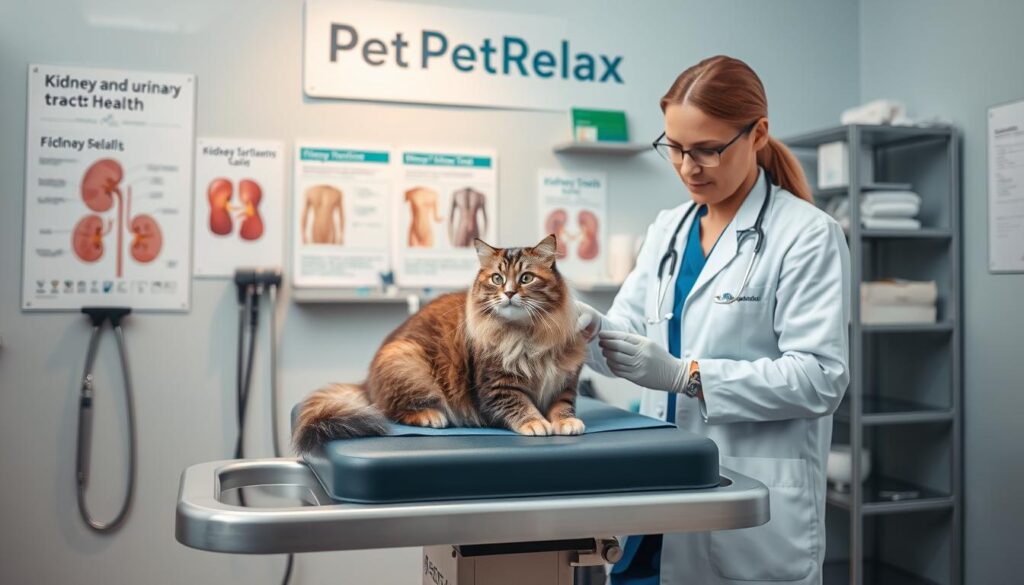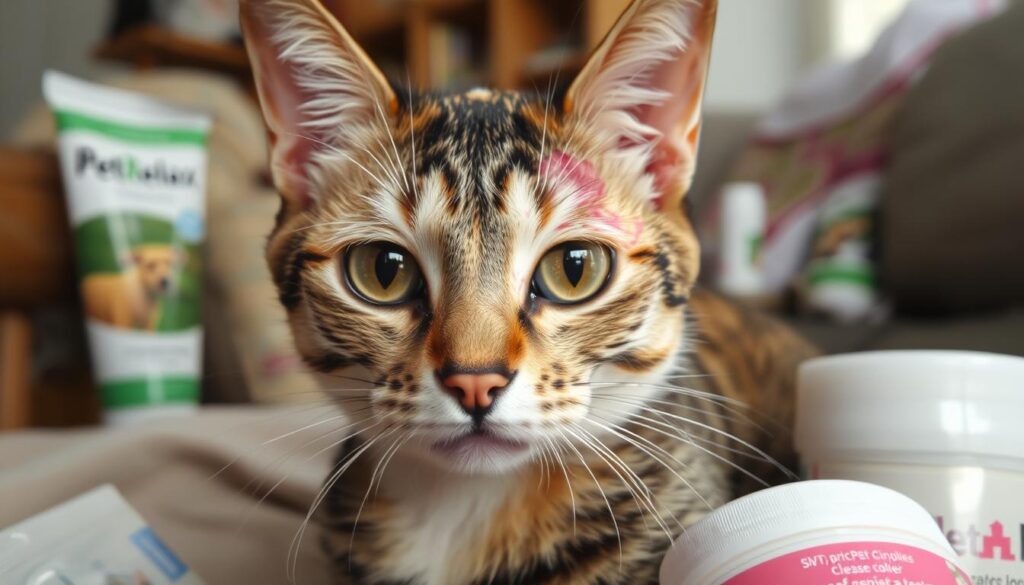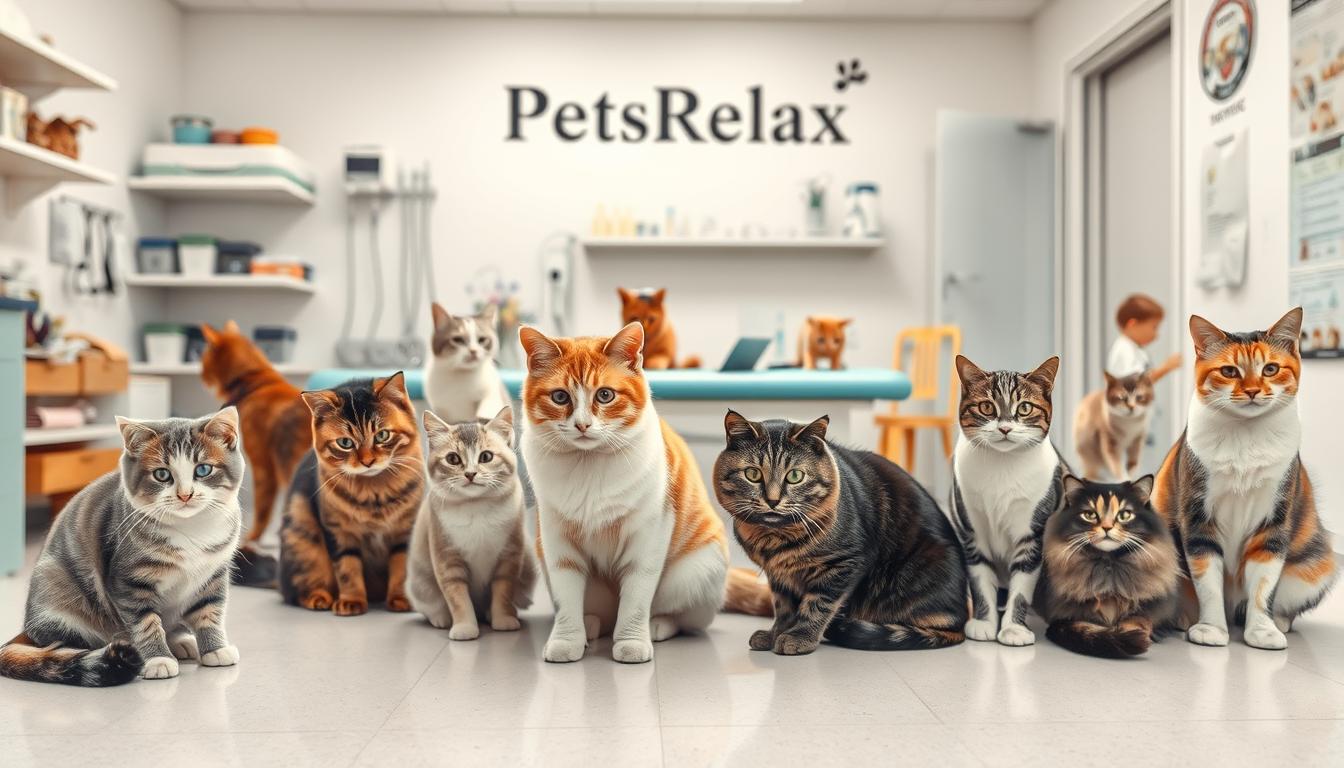As a cat owner, it’s vital to spot and tackle health issues in your pet. Feline diseases and cat illnesses can be minor or serious. Knowing the signs and symptoms is key. This knowledge helps improve your cat’s life and prevents problems.
Common health issues in cats include breathing problems, digestive issues, and kidney disease. Knowing about these and how to treat them is important. By being alert and getting vet care when needed, you can ensure your cat stays healthy and happy.
It’s crucial to understand the importance of addressing health problems in cats. By staying informed and proactive, you can prevent and treat many health issues. This way, your cat can live a long, healthy life, free from diseases and illnesses.
Key Takeaways
- Recognizing signs and symptoms of cats health problems is crucial for prompt treatment
- Feline diseases and cat illnesses can range from minor to life-threatening conditions
- Proper care and treatment can significantly improve your cat’s quality of life
- Common health issues include respiratory problems, digestive problems, and kidney disease
- Staying informed and seeking veterinary care when necessary can help prevent and treat cats health problems
- Regular check-ups and preventative care can help identify potential health issues early on
Top Respiratory Issues in Felines: From Colds to Infections
Respiratory problems are common in cats of all ages. These issues can range from mild infections to severe conditions like asthma. It’s important to know the causes, symptoms, and treatments to care for your cat properly.
Common respiratory issues in cats include upper respiratory infections, pneumonia, and chronic bronchitis. These can be caused by viruses, bacteria, allergies, or environmental factors. Spotting symptoms like coughing, sneezing, and breathing trouble is key to getting your cat the help it needs.
To prevent and manage respiratory problems, keep your cat healthy. Feed them well, ensure good air flow, and avoid allergens. These steps can help keep your cat’s respiratory system in top shape.
Common Respiratory Infections
- Upper respiratory infections
- Pneumonia
- Chronic bronchitis
Chronic Respiratory Conditions
Chronic conditions like asthma can greatly affect a cat’s life. They need ongoing care, including medication and lifestyle changes. With a vet’s help, you can manage your cat’s condition and improve their health.
Digestive Problems and Gastrointestinal Health in Cats
Cats often face digestive issues, which can affect their health. It’s important to know the sick cat symptoms and cat health problems signs. This helps in getting timely care and avoiding serious problems. Common issues include inflammatory bowel disease, foreign bodies in the gut, and food allergies.
These problems can show mild to severe symptoms like vomiting, diarrhea, and belly pain. Keep an eye on your cat’s behavior and any changes in their eating, stool, or mood. These signs can point to feline health concerns. Knowing the causes and symptoms helps in preventing and managing these issues in your cat.

- Inflammatory bowel disease
- Gastrointestinal foreign bodies
- Food allergies
If you think your cat has one of these problems, get vet help fast. Your vet can offer advice on food and solutions for your cat’s digestive health.
Kidney and Urinary Tract Conditions in Cats
Kidney and urinary tract issues are common in cats and can really affect their life quality. It’s important to keep an eye on your cat’s health in these areas. Kidney disease, urinary infections, and stones are common problems that can happen at any age.
Knowing what causes these issues, their symptoms, and how to treat them is key. Kidney disease, for example, can come from genetics, age, and diet. Early detection and prevention are crucial to avoid serious problems and improve treatment. Working with your vet can help you manage these issues in your cat.
Some common signs of kidney and urinary tract problems in cats include:
- Increased thirst and urination
- Accidents outside the litter box
- Changes in appetite or weight
- Vomiting or diarrhea
If you see any of these signs, get your cat to the vet fast. Your vet can run tests to find out what’s wrong and create a treatment plan.

By focusing on your cat’s kidney and urinary health, you can prevent many problems. Regular vet visits, a balanced diet, and a safe home are all important. They help keep your cat healthy and happy for a long time.
Skin Problems and Coat Health Issues
Cats are known for their sleek and shiny coats. But, skin problems and coat health issues can affect any cat. These issues can be caused by allergies, parasitic infections, and skin infections. Regular grooming and vet visits can help spot these problems early.
Some common skin problems in cats include flea allergy dermatitis, food allergies, and environmental allergies. These can cause itching, scratching, and hair loss. Feline diseases like ringworm and mange can also harm a cat’s skin and coat, leading to crusty lesions and hair loss.

Treatment for skin problems and coat health issues varies. Sometimes, medication or topical treatments are needed. Other times, changes in diet or environment are recommended. By working with a vet and taking proactive steps, cat owners can help their pets live happy and healthy lives.
- Regular grooming to reduce shedding and prevent hairballs
- Keeping the cat’s living area clean and free of allergens
- Providing a balanced and nutritious diet to support skin and coat health
By following these tips and knowing about common skin and coat issues, owners can prevent and manage them. This reduces the risk of complications and improves their cat’s health and well-being.
Dental Disease and Oral Health Concerns
Cats often face pet cat health issues like dental disease and oral health problems. These issues can stem from bad oral care, diet, or genetics. They can cause common cat ailments such as bad breath, gum inflammation, and tooth loss.
Some common cat medical conditions include periodontal disease, tooth resorption, and oral infections. Periodontal disease is a bacterial infection that harms gums and teeth. Tooth resorption breaks down tooth structure, often from trauma or infection. Oral infections, caused by bacteria, viruses, or fungi, can lead to swelling, pain, and eating troubles.
To fight dental problems in cats, owners can take several steps. These include:
- Regular dental care, like brushing and cleaning teeth
- Feeding a balanced diet that supports oral health
- Regular vet check-ups to monitor dental health
By knowing about common dental issues in cats and taking preventive measures, owners can improve their cat’s life quality. This helps reduce the risk of serious complications.
Age-Related Health Issues in Senior Cats
As cats get older, they face more health problems. It’s important to know the sick cat symptoms and cat health problems signs to care for them well. Arthritis is a common issue in older cats, causing pain and trouble moving.
Cognitive decline is another big concern. It can make cats act differently, forget things, and get lost. Feline health concerns like these need quick action and treatment. Knowing what causes and shows these problems helps cat owners take care of their pets better.
Some common signs of age-related health issues in senior cats include:
- Changes in appetite or water intake
- Weight loss or gain
- Changes in sleep patterns or behavior
- Decreased mobility or flexibility
Regular vet visits and a good diet can help manage age-related health issues in senior cats. By watching for sick cat symptoms and cat health problems signs, owners can give their pets the best care. This improves their life quality a lot.
Essential Preventive Care and Vaccination Schedule
Regular cat veterinary care is key to keeping your cat healthy. A good vaccination schedule can protect your cat from serious cat medical conditions. It’s important to work with your vet to find the right vaccinations for your cat.
Preventive care includes regular check-ups, vaccinations, and parasite control. By focusing on these, you can prevent and manage common cat ailments. Your vet can guide you on the best preventive care for your cat.
Knowing the recommended vaccination schedule for cats is important. By prioritizing cat veterinary care and preventive care, your cat can live a long, healthy life. This way, your cat can avoid many cat medical conditions.
Natural and Holistic Treatment Options for Cat Ailments
As cat owners, we want the best for our feline friends, especially when it comes to their health. Many owners are now using natural and holistic treatments to help their cats. These options can help with feline diseases and improve their overall health and happiness.
Some owners choose herbal remedies and supplements for their cats. Omega-3 fatty acids can help with skin and coat health. Probiotics can also help with digestion. But, always talk to a vet before adding new supplements to your cat’s diet.
Herbal Remedies and Supplements
- Omega-3 fatty acids for skin and coat health
- Probiotics for digestive health
- Antioxidants to reduce oxidative stress and inflammation
Other alternative therapies like acupuncture, massage, and chiropractic care can also help. These can reduce stress, improve movement, and boost overall health. By using natural and holistic treatments, you can give your cat a more complete care plan. This can help prevent or manage feline diseases and cat illnesses.
When to Schedule an Emergency Vet Visit
As a cat owner, knowing when to seek vet help is key. Some health issues can turn serious fast if not treated right away. Severe injuries, poisoning, and certain health problems need urgent vet care to keep your cat safe.
Studies show quick action is vital in cat emergencies. Look out for signs like trouble breathing, extreme pain, or sudden mood changes. These are clear signals to get your cat to the vet fast. Knowing these signs helps protect your cat’s health.
Time is of the essence when your cat’s health is at risk. Keep up with your vet’s advice and act quickly if you see serious symptoms. With the right steps, you can help your cat avoid serious problems and get the care they need.
FAQ
What are the most common feline diseases that affect cats?
Cats often get upper respiratory infections, kidney disease, dental disease, and skin problems. Regular vet visits and preventive steps can help. This reduces the risk of these common issues.
What are the signs of sick cat symptoms that require immediate veterinary attention?
Look out for signs like trouble breathing, vomiting, diarrhea, being very tired, and not wanting to eat. If you see these, get your cat to the vet right away. This helps prevent worse problems and ensures your cat gets the care they need.
How can I prevent common cat ailments and cat medical conditions in my cat?
To prevent health issues, keep up with vet visits, feed a balanced diet, and ensure a safe, healthy home. Provide fresh water and a stress-free space. Also, keep vaccinations current and follow vet advice to prevent diseases.
What are the benefits of natural and holistic treatment options for cats health problems?
Natural treatments can be safe and effective for managing health issues. They often have fewer side effects and promote wellness. Always talk to a vet before using herbal remedies or supplements to make sure they’re safe for your cat.
When should I schedule an emergency vet visit for my cat?
Call for emergency vet care if your cat has severe injuries, poisoning, or life-threatening conditions. This includes trouble breathing or severe vomiting. If unsure, it’s best to err on the side of caution and seek vet help right away.
How often should I take my cat to the vet for routine check-ups and vaccinations?
The frequency of vet visits depends on your cat’s age, health, and lifestyle. Kittens need more visits, while adult cats might only need yearly check-ups. Talk to your vet to find the best schedule for your cat’s care and vaccinations.
What are the most common digestive problems that affect cats, and how can I manage them?
Cats often face issues like inflammatory bowel disease, foreign bodies in the gut, and food allergies. Managing these needs dietary changes, medication, and lifestyle adjustments. Your vet can help find the best treatment and care plan for your cat.
How can I promote dental health and prevent dental disease in my cat?
To keep your cat’s teeth healthy, brush regularly, feed a balanced diet, and schedule dental check-ups. This helps prevent dental disease and related health issues. Also, keep up with vaccinations and follow your vet’s care plan to prevent diseases.
What are the signs of kidney disease in cats, and how can I manage the condition?
Signs of kidney disease include increased thirst and urination, weight loss, and less appetite. Managing it involves dietary changes, medication, and lifestyle adjustments. Your vet can help find the best treatment and care plan for your cat.
How can I recognize the signs of age-related health issues in my senior cat, and what can I do to promote their health and wellness?
Regular vet check-ups and monitoring for changes in behavior and physical condition are key. To promote health, provide a comfortable home, ensure regular vet care, and adjust diet and lifestyle as needed. Keeping up with vaccinations and following your vet’s care plan also helps prevent diseases.

